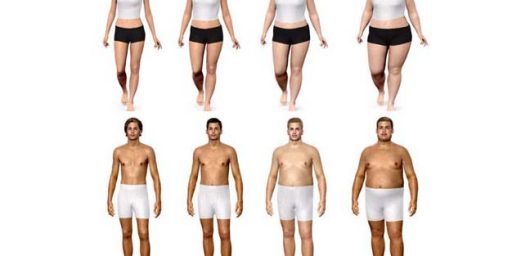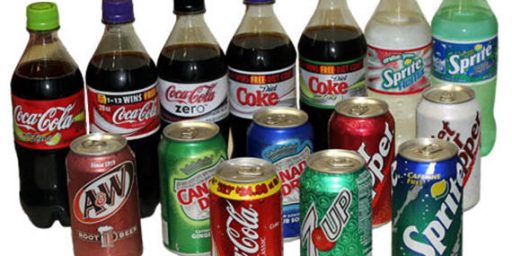Diet Sodas Linked to Obesity
A recent scientific study showed that fat people drink more diet soda than thin people.
Just when you thought the news about losing weight couldn’t get any worse, try this: A review of 26 years of patient data found that people who drink diet soft drinks were more likely to become overweight. Not only that, but the more diet sodas they drank, the higher their risk of later becoming overweight or obese – 65 percent more likely for each diet drink per day.
The findings, the latest from the long-term San Antonio Heart Study, took even the researchers by surprise. “I was baffled,” said Sharon Fowler, a faculty associate at the University of Texas Health Science Center, who presented the data Saturday at the American Diabetes Association’s 65th Annual Scientific Sessions in San Diego, Calif.
Researchers looked at questionnaires and medical records for 1,177 patients who began enrolling in the study in 1979. All had weights considered either normal or overweight, but not obese. The volunteers were asked how many soft drinks per day they usually drank and whether they were regular or diet – or a combination of each. The researchers followed up with them over the years.
Drinking any soda – regular or diet – was linked to a higher risk of becoming overweight. But when the researchers adjusted the data to account for differences in age, sex and ethnicity, they found that regular soft drinks had very little connection with serious weight gain. Diet drinks, however, did.The researchers are quick to point out that their findings are not proof that drinking diet soft drinks causes people to become heavy. It could be that as they began gaining weight, they switched from regular to diet drinks.
No kidding. I’m guessing they would find similar results for low fat ice cream, Snackwells, low carb pizza, and other products bearing the Atkins, South Beach Diet, and Weight Watchers labels. The number of purportedly scientific medical studies relying on simple correlation, which would get a freshman political science student a D-minus, continues to astound me.
John Hawkins notes the old Social Science 101 teaching point of noting that ice cream sales and incidences of rape are positively correlated. The instructor eventually gets the student to realize that the correlation is spurious and that a third variable, in this case “heat,” is correlated to both. A more direct example is that ice cream sales and drownings are related, also because both increase during hot weather. Thus, freshmen social scientists learn immediately that correlation does not equal causality. Surely, medical researchers know that, too.






“The researchers are quick to point out that their findings are not proof that drinking diet soft drinks causes people to become heavy. It could be that as they began gaining weight, they switched from regular to diet drinks.”
It could be.
It could be.
This bit of brilliant research is apparently being funded by NIH. Your tax dollars at work.
More likely, IMO, is the fact that overeaters (I have the tendency, I must admit) are champion rationalizers. It’s okay to eat a big slice of pie because, after all, I had a Diet Coke with dinner instead of sugar-sweetened iced tea. The calories they “save” by drinking diet drinks are (over)compensated for by eating high-cal, low-nutrition foods. I guarantee it.
“Linked” is a loaded word that implies causation, isn’t it? But it is one that is used to highlight “studies” such as these. I wonder why the study was done, and what the “official conclusions” were.
I suspect a more accurate headline would be, “Obese are primary consumers of diet sodas”. But that headline would be likely to elicit a throughly earned “duh”.
On a related note, scientists have discovered that working as a research scientist may be linked to an increase in faulty reasoning. However, researchers are quick to point out that they may have reasoned fallacially prior to becoming a research scientist.
I guess I am trying to cut these folks a break for now, but I would be willing to bet that these findings are not the major focus of the so called San Antonio Heart Study. I find these strictly correlative studies (that is without establishing causation) really weak also. But with computers being able to handle incredible amounts of data and, hence, the ability to mine data for associations not readily apparent to our unaided intellectual capacity and sometimes biased minds I expect these types of correlations found within scientific data are going to become more prevalent. I mean that correlations will be uncovered that were not anticipated in the original study design or hypothesis. These data were presented at a scientific meeting and not in a peer-reviewed journal. In many cases these meeting presentations may be preliminary data and not the final word. I think we have to wait and see how far or if ever these data get through the peer review process. Of course, the press picks up on these kind of things all the time and some cub reporter gets a byline – you have to start your career somewhere I guess. Just some comments having been in close proximity to researchers for a while.
I would also be willing to bet that the more they consume their diet soda, the less water they drink.
Caffein is not good for the body-even if it is being consumed in a sugarless drink.
I also agree that by in large overweight people probably consume larger amounts of almost any kind of food than thin people do (granted there will be some exceptions).
The lack of simple logic in some of these studies really is appalling. Are they trying to make some kind of case for regulating diet soda, or are they just not very bright?
I think that without knowing more, it’s hard to tell whether or not the criticisms are fair. First, it’s clear that the authors are not claiming causation. From a different article:
Also, I think it’s very easy for the media to miss the careful nuances of scientific reasoning. For example, it’s possible that Fowler said something like:
The media misses the point that she was not baffled that diet soda and obesity are correlated, but that low-fat snack foods and obesity are not correlated.
Lastly, some Googling seems to indicate that the San Antonio Heart Study is really much more than just tracking diet soda. So it’s possible that the diet soda consumption was being studied for more significant reasons, and that this was just a minor result.
This is how researchers get their name in the news.
It is very difficult to be obese in this culture because we are so obvious! We are a target for pity cloaked in a medical study which purports to want us to live longer. I suspect it is just easier to feel superior to us because we are so noticible. It’s cussed tough to I.D. criminals, dope dealers, sexual deviants, pedophiles or Enron white collar thiefs, all of whom are real threats to society, but just see a fat person, and he is fodder for gratuitous remarks, patronizing comments,.and silly studies masked as good science.
I used to joke I stopped drinking diet sodas when I noticed only fat people drank them. Now it’s apparently been scientifically proven that fat people would like to lose weight. That ought to be worth a Nobel.